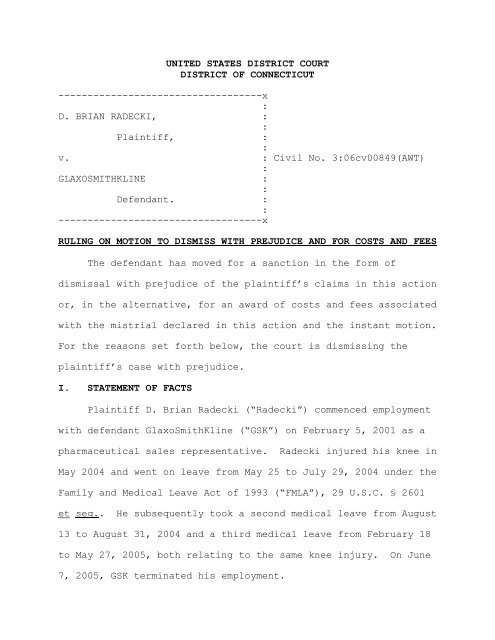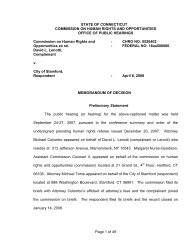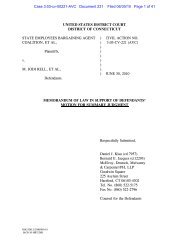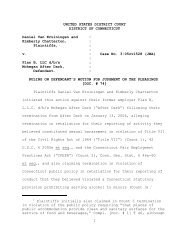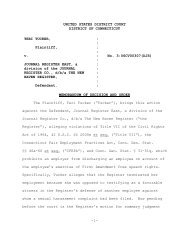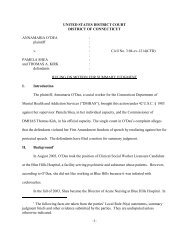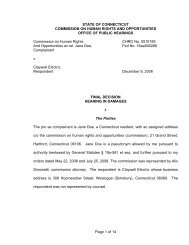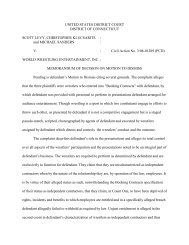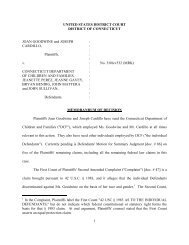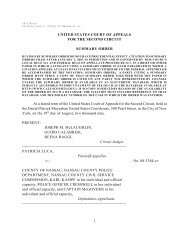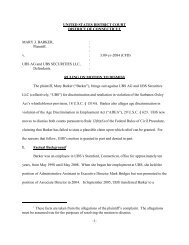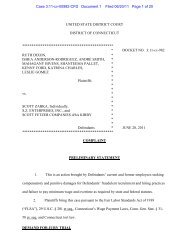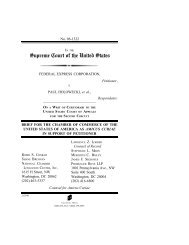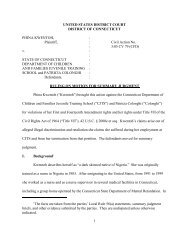Radecki v. GlaxoSmithKline - Connecticut Employment Law Blog
Radecki v. GlaxoSmithKline - Connecticut Employment Law Blog
Radecki v. GlaxoSmithKline - Connecticut Employment Law Blog
Create successful ePaper yourself
Turn your PDF publications into a flip-book with our unique Google optimized e-Paper software.
UNITED STATES DISTRICT COURTDISTRICT OF CONNECTICUT-----------------------------------x:D. BRIAN RADECKI, ::Plaintiff, ::v. : Civil No. 3:06cv00849(AWT):GLAXOSMITHKLINE ::Defendant. ::-----------------------------------xRULING ON MOTION TO DISMISS WITH PREJUDICE AND FOR COSTS AND FEESThe defendant has moved for a sanction in the form ofdismissal with prejudice of the plaintiff’s claims in this actionor, in the alternative, for an award of costs and fees associatedwith the mistrial declared in this action and the instant motion.For the reasons set forth below, the court is dismissing theplaintiff’s case with prejudice.I. STATEMENT OF FACTSPlaintiff D. Brian <strong>Radecki</strong> (“<strong>Radecki</strong>”) commenced employmentwith defendant <strong>GlaxoSmithKline</strong> (“GSK”) on February 5, 2001 as apharmaceutical sales representative. <strong>Radecki</strong> injured his knee inMay 2004 and went on leave from May 25 to July 29, 2004 under theFamily and Medical Leave Act of 1993 (“FMLA”), 29 U.S.C. § 2601et seq.. He subsequently took a second medical leave from August13 to August 31, 2004 and a third medical leave from February 18to May 27, 2005, both relating to the same knee injury. On June7, 2005, GSK terminated his employment.
<strong>Radecki</strong> filed this action, claiming that GSK terminated hisemployment in retaliation for him exercising his rights under theFMLA, terminated his employment in retaliation for him engagingin protected speech, in violation of <strong>Connecticut</strong> General Statutes§ 31-51q, and terminated his employment in violation of publicpolicy. GSK contends that it terminated <strong>Radecki</strong>’s employmentonly after a compliance investigation revealed that the plaintiffhad, on at least ten different occasions, falsified companyrecords regarding his call reporting activities, and then onlyafter allowing him to take advantage of FMLA leave it hadapproved. The court granted summary judgment in favor of GSK onthe second claim, and the case proceeded to trial on the FMLAretaliation and wrongful termination in violation of publicpolicy claims.Because <strong>Radecki</strong> had only worked for a relatively shortperiod during the almost four years since GSK terminated hisemployment, one of the issues at trial was whether he hadmitigated damages. During his direct examination on May 7, 2009,<strong>Radecki</strong>’s attorney asked him about his efforts to find work afterthe date on which GSK terminated his employment. The pertinenttestimony is as follows:Q: Did there ever come a time that you stopped lookingfor work?A: Yes.Q: When?A: In November of last year.Q: Why?-2-
A: Because of the last week of October I learned that Ihad -- have stage III prostate cancer with a metastaticbrain lesion.Q. How long did that -- did you get treatment for that?A. Yes.Q. When was that concluded?A. Well, the major -- the major conclusion was I hadsurgery in January.Q. Did you resume your job search after that?A. I have at least on paper. I’m still inrehabilitative mode.(Trial Tr. Vol. I, 152, May 7, 2009.) The plaintiff’s counselhad not known anything about “a metastatic brain lesion” untilhis testimony was given.After the jury had been excused for the day, defense counselexpressed a concern that “<strong>Radecki</strong>’s Stage III metastatic cancerwas not disclosed” to the defense, notwithstanding the pertinentinterrogatory and production request that had been propounded bythe defendant, and stated that had it been disclosed, thedefense, would have moved in limine with respect to thatevidence. Id. at 193. The plaintiff’s counsel stated inresponse that a document provided a week earlier, i.e., a copy of<strong>Radecki</strong>’s request for an extension for paying his taxes for 2008,which admittedly was not responsive to the pertinentinterrogatory and production request, contained a statement that<strong>Radecki</strong> had undergone cancer treatment. The court did notaddress that issue but, rather, observed that had a motion inlimine been filed, it would have been granted and that theplaintiff would have been allowed only to make a general-3-
eference to health problems. The court and counsel agreed toconsider the matter overnight and discuss it further the nextmorning.The next morning, the defense informed the court that it wasmoving for a mistrial. In support of its motion for a mistrial,the defense argued first that “[t]he assumption . . . that jurieswill follow limiting and curative instructions does not applywhen prejudice is so severe that the instructions would beineffective.” (Trial Tr. Vol. II, 199, May 8, 2009) (citingUnited States v. Hamdy, No. 05-CR-232S, 2006 U.S. Dist. LEXIS44043, at *6 (W.D.N.Y. June 28, 2006) (citation and internalquotation marks omitted)). The defense contended that theprejudice was so severe here so as to render a curativeinstruction ineffective because, based on <strong>Radecki</strong>’s statementthat he had stage III prostate cancer with a metastatic brainlesion, the jury could reasonably infer that <strong>Radecki</strong> was dying.The court agreed that such an inference would be a reasonableone. In addition, the defense pointed to a concern that when<strong>Radecki</strong> was asked if he was looking for a job after his surgery,he said “on paper,” and whereas the defense would ordinarilyconfront a witness who gave such a response about his effort tomitigate damages, if the defense sought to confront the plaintiffon that point, it would simply remind the jury about his cancer.At the point the motion for a mistrial was made, the defense-4-
proceeded with the understanding that <strong>Radecki</strong> had a metastaticbrain lesion, as did <strong>Radecki</strong>’s counsel and the court.Thecourt and counsel discussed various options as to how to proceed.The court eventually decided to require the plaintiff to obtainand deliver to the defense all his medical records, and alsodecided to meet with counsel later that day after defense counselhad an opportunity to review the medical records. After theparties were informed that the plaintiff would be required toturn over his medical records, <strong>Radecki</strong> had a private conversationwith his counsel, immediately after which his counsel stated:I just want to clarify one other issue, I don’t know ifwe need to go any further with it. With respect to the illness andthe treatment itself, he had the surgery and the postoperativecourse. Right now apparently he’s clear. The brain issue is notan issue–-what showed up on the imaging had not progressed, didn’twarrant treatment. I wanted you to understand. You mentioned theissue that they could be concerned that he might be [dying], wecould actually resolve that if you want to. He’s apparently clearnow.(Trial Tr. Vol. II, 213, May 8, 2009.) The jury was excused forthe day, and a recess followed.On the afternoon of May 8, the court continued the hearingafter the defense had had an opportunity to review theplaintiff’s medical records. <strong>Radecki</strong>’s medical records reflectthat he was given a whole body bone scan on October 2, 2008. Thedoctor noted a small non-specific abnormality in the rightfrontal skull and observed that the mild intensity and small sizesuggested that it was benign. However, the doctor stated that a-5-
small metastatic lesion at the site could not be entirely ruledout. Correlation with an MRI was recommended for follow up. Thereport concludes that all other abnormalities were not stronglysuspicious for metastatic disease. On October 24, 2008, <strong>Radecki</strong>was seen by another physician who wrote in his report that he hadreviewed <strong>Radecki</strong>’s bone scan and CT scan report and had spokenwith the doctor who read the bone scan. The October 24, 2008report notes that <strong>Radecki</strong> would be getting an MRI of his head inthe near future. It also states that the lesion is notconcerning for the doctor from a metastatic perspective but thedoctor would wish to rule out other etiology of this finding.Also, it states that the patient is in agreement. Finally, onOctober 31, 2008, <strong>Radecki</strong> had a cranial MRI. The report of theexamination states that the MRI scan of the brain revealed noevidence of a mass lesion and that there was no evidence ofmetastatic disease to the brain.After receiving a report on the contents of <strong>Radecki</strong>’smedical records, the court informed the parties that if it couldcraft an appropriate curative instruction, it would canvas themembers of the jury to determine whether each juror could followthe instruction and would excuse any juror the court concludedwould not be able to do so. After further discussion withcounsel, however, the court concluded that it could not craft anappropriate curative instruction. A curative instruction that-6-
merely told the jurors not to consider the plaintiff’s prostatecancer would have left the defendant in a position where it wouldbe unfairly limited in cross-examination on the issue ofmitigation of damages. In addition, in order to be notmisleading, any curative instruction would have had to addressthe plaintiff’s testimony concerning a metastatic brain lesion,and would have made it clear that the plaintiff never had ametastatic brain lesion. The court concluded that an instructionconveying that information would be extremely prejudicial to theplaintiff because it would be, in substance, a negativecommentary by the court on the plaintiff’s credibility. Thiscommentary would have been particularly significant in this case,where the defendant’s contention is that the plaintiff was firedbecause he falsified records regarding his call reportingactivities. Consequently, the court concluded that anappropriate curative instruction could not be given under thecircumstances and declared a mistrial.During the discussion that afternoon, the defense hadinformed the court that it wanted an opportunity to file a motionto dismiss with prejudice. The defense was permitted to conductdiscovery to prepare for that motion and/or a new trial, and<strong>Radecki</strong> was re-deposed on June 19, 2009. <strong>Radecki</strong> was asked aboutthe meeting with his doctor, which occurred on October 24, 2008.<strong>Radecki</strong> testified as follows:-7-
Q. When you walked out of the door, what was yourunderstanding–- when you walked out of that meeting. . ., what was your understanding of your healthcondition at that time?A. That I definitely had prostate cancer and probablyhad a brain tumor.Q. Did you later learn that that wasn’t –- that you didnot have the brain tumor?A. Yes, when I sat in my car on the 6th of November andopened this up.(<strong>Radecki</strong> Dep. 550:6-15, June 19, 2009.) Thus, <strong>Radecki</strong> concedesthat by November 6, 2008, he knew that he did not have ametastatic brain lesion.II.DISCUSSIONAfter considering <strong>Radecki</strong>’s testimony on May 7, 2009 and theother relevant evidence, the court concludes, on the basis ofclear and convincing evidence, that he committed perjury and thata sanction is appropriate. After considering the possiblesanctions available, the court concludes that a sanction ofdismissal with prejudice is most appropriate, under thecircumstances of this case, in view of the fact that <strong>Radecki</strong>committed perjury in a formal proceeding.A. PerjuryPerjury is “false testimony concerning a material matterwith the willful intent to provide false testimony, rather thanas a result of confusion, mistake, or faulty memory.” U.S. v.Dunnigan, 507 U.S. 87, 94 (1993).<strong>Radecki</strong> gave false testimony when he stated “I had -- havestage III prostate cancer with a metastatic brain lesion.”-8-
(Trial Tr. Vol. I, 152, May 7, 2009.) At no time did <strong>Radecki</strong>have a metastatic brain lesion. Thus, his testimony was falsewhen he testified on May 7, 2009 that in the past, he had beenafflicted with a metastatic brain lesion, and it was also falsewhen he testified that on May 7, 2009 he was then afflicted witha metastatic brain lesion.The false testimony concerned a material matter. Mitigationof damages was a material issue in the trial because <strong>Radecki</strong> hadworked for a very limited period of time after GSK terminated hisemployment, and the testimony was offered as part of his reasonfor failing to obtain a new job. The false testimony was alsomaterial in the context of the entire case because it had tocause the members of the jury to feel a great deal of sympathyfor him. As the court observed on the morning of May 8:[H]aving heard the statement from Mr. <strong>Radecki</strong> yesterdaymyself, I can tell you that I think everybody in thecourtroom naturally felt a great deal of sympathy forhim. It’s only human and it’s quite natural andappropriate.(Trial Tr. Vol. II, 204, May 8, 2009.) Defense counselaccurately described the effect of <strong>Radecki</strong>’s testimony when hestated that “the metastasis with brain involvement, brain lesion,took the air out of the courtroom.” (Tr. of Oral Argument at 20,July 27, 2009.) Although the plaintiff argued that once it hadbeen disclosed that he had stage III prostate cancer, theadditional statement about a metastatic brain lesion did not-9-
further prejudice the defendant, the court disagrees. Whilestage III prostate cancer is a serious condition, adding ametastatic brain lesion makes it significantly more serious.The record here also establishes that <strong>Radecki</strong> gave the falsetestimony with the willful intent to provide false testimony,rather than as a result of confusion, mistake, or faulty memory.Whether <strong>Radecki</strong> was only somewhat concerned during the periodending on November 6, 2008 about a possibility that he might havea brain tumor, or <strong>Radecki</strong> thought during that period that he“probably had a brain tumor,” is immaterial. (<strong>Radecki</strong> Dep.550:11, June 19, 2009.) Under either scenario, once <strong>Radecki</strong>learned on November 6 that there was no evidence of metastaticdisease to the brain, he had to have been greatly relieved.Every indication is that this was a memorable piece of news forthe plaintiff and that he would remember the difference betweenlearning that he did not have a metastatic brain lesion and thathe had one. Based on a review of the record, the court cannotconclude that his false testimony was the result of confusion,1mistake, or faulty memory. In addition, the fact that <strong>Radecki</strong>changed the tense of his statement from “had” to “have” suggeststhat he had willful intent to provide false testimony because the1Prior to a review of the record, the court’s inclinationwas to give the plaintiff the benefit of the doubt on thequestion of perjury, as the court informed the parties on theafternoon of May 8, 2009. (See Trial Tr. Vol. II, 237-38, May 8,2009.)-10-
change conveyed to the jury not just that he had been sufferingfrom a metastatic brain lesion at the time he was not looking forwork in late 2008 but also that he would be continuing to sufferfrom a metastatic brain lesion. At that point, <strong>Radecki</strong> knew thatno one else in the courtroom, not even his own attorney, had anyinformation to the contrary. Finally, once it became apparentduring argument on the motion for a mistrial that the plaintiffwould be required to provide his medical records to the defense,<strong>Radecki</strong> spoke to his attorney, who then reported to the courtthat “[t]he brain issue is not an issue –- what showed up on theimaging had not progressed, didn’t warrant treatment” and that<strong>Radecki</strong> is “apparently clear now.” (Trial Tr. Vol. II, 213, May8, 2009.) Looking at <strong>Radecki</strong>’s conduct in context, the courtconstrues this statement to be an effort to avoid the requirementof producing the medical records. In addition, the statement wasmaterially misleading in that it suggested that what showed up onthe imaging was something that could have progressed into ametastatic brain lesion. The statement was also materiallymisleading in that it failed to acknowledge that since November6, 2008 <strong>Radecki</strong> had known that there was no evidence ofmetastatic disease to the brain.For these reasons, the court concluded that the plaintiffwillfully provided false testimony for the improper purpose ofcausing the jury to feel sympathy for him.-11-
B. Most Appropriate SanctionIn determining what sanction is most appropriate, the courtfound it helpful to review decisions in other cases where a partycommitted perjury or engaged in substantially similar conduct.In Campos v. Correction Officer Smith, 418 F. Supp. 2d 277, 279(W.D.N.Y. 2006), the pro se plaintiff “knowingly submitted afalsified exhibit in an attempt to rebut [the] defendants’contention that he never appealed [a] grievance” and thus hiscomplaint should be dismissed for failure to exhaustadministrative remedies. The court concluded that “[a]plaintiff’s knowing presentation of a falsified document to acourt is sufficient grounds for dismissal of his complaint.” Id.In Combs v. Rockwell International Corp., 927 F.2d 486, 488 (9thCir. 1991), “Combs authorized [his] counsel to alter hisdeposition in material respects. He signed the reviseddeposition and swore, under penalty of perjury, that he hadreviewed the transcript and had himself made the changes.” Thecourt concluded that “[d]ismissal is an appropriate sanction forfalsifying a deposition.” Id. In Dotson v. Bravo, 202 F.R.D.559 (N.D. Ill. 2001), the plaintiff used a false name in hisdeposition and in answers to interrogatories. The courtconcluded that dismissal with prejudice was appropriate inresponse to the plaintiff’s “deliberate and persistent failure toidentify himself and for engaging in a pattern of obstructive-12-
discovery tactics designed and intended to impair and inhibitdefendants’ discovery of his identity and arrest history.” Id.at 576.In Knapp v. Convergys Corp., 209 F.R.D. 439, 442 (E.D. Mo.2002), the court “found by clear and convincing evidence thatPlaintiff gave perjurious answers in her interrogatories andduring her deposition.” The court concluded that dismissing theplaintiff’s case was “the appropriate sanction for her deliberateand continued abuse of the discovery process.” Id. In Martin v.DaimlerChrysler Corp., 251 F.3d 691, 695 (8th Cir. 2001), theplaintiff also “gave perjurious answers during her deposition andin her interrogatory responses.” The court concluded that thetrial court “did not abuse its discretion in dismissing the[plaintiff’s] suit as a sanction for her repeated perjury.” Id.In Pope v. Federal Express Corp., 974 F.2d 982 (8th Cir. 1992),Pope and her lawyer knowingly presented a falsified document andPope lied during her deposition when testifying about thedocument. The court held:Dismissal of Pope’s lawsuit is a severe sanction,yet under the circumstances we cannot find that such asanction constitutes an abuse of the district court’sdiscretion. The dismissal of Pope’s suit was based onthe district court’s finding that manufactured evidenceand perjured testimony had been introduced in an attemptto enhance the case through fraudulent conduct. When alitigant’s conduct abuses the judicial process, theSupreme Court has recognized dismissal of a lawsuit to bea remedy within the inherent power of the court.Chambers v. NASCO, Inc., 501 U.S. 32, ----, 111 S.Ct.2123, 2133, 115 L.Ed.2d 27 (1991).-13-
Id. at 984.By contrast, in Bower v. Weisman, 674 F. Supp. 109 (S.D.N.Y.1987), the plaintiff gave false testimony during her deposition.When examination of another witness revealed that the plaintiffhad testified falsely, the plaintiff served an affidavit on thedefendant changing her answers and subsequently testifiedtruthfully at a follow-up deposition ordered by the court. Thecourt concluded that a sanction of dismissal was not appropriatebecause “Bower had already testified as to having sexualrelations with others than Weisman during the time period atissue. The belated addition of three more affairs--while veryserious due to the fact of the perjury itself--has little effecton the merits of action . . . .” Id. at 112. In addition, thecourt concluded that the defendant had not been prejudicedbecause there had been sufficient time for him to conductadditional discovery and prepare for trial. However, the courtconcluded that a sanction in the form of the costs and fees thedefendant had been required to expend because of the plaintiff’sperjury was the appropriate sanction.In Kravetz v. U.S. Trust Co., 941 F. Supp. 1295 (D. Mass.1996), the court declined to dismiss the plaintiffs’ case becausethe defendants failed to demonstrate by clear and convincingevidence that the plaintiffs “committed perjury, fabricatedevidence, or perpetrated some other ‘unconscionable scheme.’”-14-
Id. at 1301. In Rybner v. Cannon Design, Inc., No. 95 Civ. 0279(SS), 1996 WL 470668 (S.D.N.Y. Aug. 20, 1996), the plaintifftestified falsely during his deposition. Two and a half weeksafter the deposition, his counsel disclosed to the defense thatthe plaintiff had “made certain misstatements with respect to hisprevious employment during his deposition.” Id., at *2. Rybnerwas deposed for a second time the following month and at thattime admitted that he knew during his first deposition that hewas testifying falsely. The court concluded that Rybner’sconduct was not sufficiently egregious to warrant a sanction ofdismissal and imposed a sanction in the form of costs and feesassociated with conducting the first and second deposition; thecourt also stated that it would permit the defendants to informthe jury of Rybner’s dishonesty and the court would give a jurycharge that “any falsehood under oath should be consideredseriously by jurors in assessing [Rybner’s] credibility.” Id. at*6.None of these cases involved perjury during a trial, whichis the situation here. However, in ABF Freight System, Inc. v.NLRB, 510 U.S. 317 (1994), an employee gave false testimony underoath before an administrative law judge (“ALJ”). The Courtconcluded that the National Labor Relations Board did not abuseits discretion in declining to adopt a rigid rule precludingreinstatement when a former employee gives false testimony before-15-
an ALJ. Key to the Court’s holding was its view that “[w]henCongress expressly delegates to an administrative agency theauthority to make specific policy determinations, courts mustgive the agency’s decision controlling weight unless it is‘arbitrary, capricious, or manifestly contrary to the statute.’”Id. at 324. The Court’s views on false testimony were quiteclear. The court stated that “[f]alse testimony in a formalproceeding is intolerable.” Id. at 323.In any proceeding, whether judicial or administrative,deliberate falsehoods “well may affect the dearestconcerns of the parties before a tribunal,” United Statesv. Norris, 300 U.S. 564, 574, 57 S.Ct. 535, 539, 81 L.Ed.808 (1937), and may put the factfinder and parties “tothe disadvantage, hindrance, and delay of ultimatelyextracting the truth by cross examination, by extraneousinvestigation or other collateral means.” Ibid. Perjuryshould be severely sanctioned in appropriate cases.Id. In a concurring opinion, Justice Scalia observed that “[t]heprinciple that a perjurer should not be rewarded with ajudgment--even a judgment otherwise deserved--where there isdiscretion to deny it, has a long and sensible tradition in thecommon law.” Id. at 329.After reviewing the authorities discussed above, the courtadvised counsel during oral argument on the instant motion thatit had concluded that the appropriate sanction in this case waseither a sanction of dismissal or a sanction in the form of anaward to the defendant of its costs and fees associated with themistrial and the instant motion. The imposition of either-16-
sanction in response to perjury is a remedy within the inherentpower of the court. Chambers v. NASCO, Inc., 501 U.S. 32, 45(1991). No lesser sanction would constitute an adequatestatement as to the seriousness of the effect of the plaintiff’smisconduct on the adjudicative process in this case and provideadequate protection for the integrity of trial proceedings bydeterring others who might be tempted to engage in suchmisconduct. In considering the cases where a sanction in theform of costs and expenses was imposed, the court places weighton the fact that those cases did not involve perjury in a formalproceeding, i.e., the context in which such strong language wasused by the Supreme Court in ABF Freight System. Bower andRybner both involved perjury during a deposition, and in eachcase, the perjury was disclosed before trial by counsel for theperson who gave the perjurious testimony–-albeit not until it wasapparent that the perjury was about to be uncovered. <strong>Radecki</strong> hadan opportunity to make an accurate voluntary disclosure, butinstead made one that was misleading. In Bower, the courtconcluded that the perjury had little effect on the merits, andin both cases, the perjury occurred sufficiently in advance ofthe trial on the merits so that the opposing party had sufficienttime to be prepared for trial with the benefit of truthfultestimony. Here, it appears that the perjury would have had amaterial effect on the trial, and because the perjury occurred at-17-
trial, there was no time for the opposing party to prepare fortrial with the benefit of truthful testimony. While most of thecases discussed above involved repeated acts of perjury or otherdishonesty, none involved perjury at trial, which is a situation2where the opposing party is put at a greater disadvantage. Ifthe perjury is discovered at trial, there is little or no time toinvestigate or prepare to attack it; if the perjury does not cometo light until after the trial, the opposing party must satisfythe requirements of Federal Rule of Civil Procedure 60(b) or (d)to get any relief it desires.3In addition, as the Court stated in ABF Freight System,[f]alse testimony in a formal proceeding is intolerable.” ABFFreight Sys., 510 U.S. at 323. To have the plaintiff in thiscase pay a monetary penalty and then return to court and present2As the court discussed with counsel, in a case being triedto a jury, the determination as to whether a witness is tellingthe truth is to be made by the jury. Thus, the court would nothave been receptive to a motion for a sanction of dismissalduring a trial on the ground that a witness was committingperjury. Here, however, the motion for a mistrial was made onthe basis of unfair prejudice and with a belief that theplaintiff’s testimony was true. The motion for a mistrial wasgranted because the court concluded it was not possible to givethe jury an appropriate curative instruction. The motion for asanction based on the plaintiff’s perjury has been consideredonly once there is no case being presented to a jury.3See, e.g., Hazel-Atlas Glass Co. v. Hart-Ford-Empire Co.,322 U.S. 238 (1944), overruled on other grounds, Standard Oil Co.v. United States, 429 U.S. 17 (1976); Gleason v. Jandrucko, 860F.2d 556 (2d Cir. 1988); Kupferman v. Consol. Research & Mfg.Corp., 459 F.2d 1072 (2d Cir. 1972).-18-
his case before a new jury would give the appearance oftolerating “a ‘flagrant affront’ to the truth-seeking function ofadversary proceedings,” id., even if (or perhaps especially if)the court allowed the defendant to use the plaintiff’s perjurioustestimony from the first trial to attack his credibility.Therefore, the court concludes that the most appropriate sanctionin this case is a sanction of dismissal with prejudice.The defendant moved in the alternative for a sanction ofdismissal with prejudice or a sanction in the form of an award ofcosts and fees associated with the mistrial in this action andthe instant motion. Therefore, no award of costs and fees isbeing made. In any event, it appears to the court that an awardof a sanction of dismissal accompanied by an award of costs andfees would be too severe a sanction under the circumstances ofthis case, where it appears the defense has expended no more timeand money than it would have expended had the case proceeded toverdict and the jury’s verdict been in favor of the defendant.III. CONCLUSIONFor the reasons set forth above, the defendant’s Motion toDismiss with Prejudice and for Costs and Fees (Doc. No. 53) ishereby GRANTED in part and DENIED in part. The plaintiff’s caseis hereby dismissed with prejudice. No award of costs and feesis being made.The Clerk shall enter judgment and close this case.-19-
It is so ordered.Signed this 21st day of August, 2009 at Hartford,<strong>Connecticut</strong>./s/AWTAlvin W. ThompsonUnited States District Judge-20-


